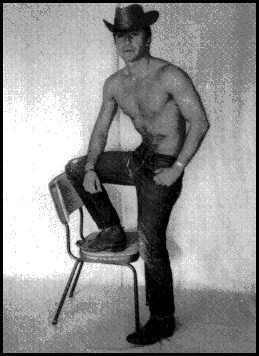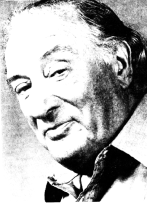The Lives
And Careers
Of John Rechy
Charles Casillo
(Advocate)

To show you I'm no square, when I was slightly longer in the tooth, I got busted by the thought police at Idlewyld (1959) for trying to smuggle in the old "Traveler's Companions" editions of The Black Book and The Thief's Journal. They were traveling in my suitcase cleverly nestled under Crime and Punishment and Anna Karenina. The customs agent held up Durrell and Genet like they were turds and said, "Buddy --- let me give you some advice. Change your taste in literatoor." (I swear, that's the way he pronounced it. He also threw the books back in my suitcase and told me to get lost.)
Whatever it is, Rechy is not my kind of guy, although I must say, the picture of him facing page 137 quite knocked me off my pins. It wasn't a photograph of him in briefs, posing for one of those thinly disguised hunk magazines from forty years ago that he so favored. Nor was it one of those leather- It was a photograph from five years ago, and he looked like he was just inching past forty. Did my eyes bug out at that one (he was born two years before I was). Maybe this guy has some tricks to teach me, I thought, my proximate decade up there in the high sixties breathing heavily down my neck. For that reason, if for no other, I gave Outlaw my all. Unfortunately, this one is heavy, I mean leaden, with neo-Freudian speculation. Did Roberto, Rechy's unloving dad, scar him fatally by having him sit on his lap when he was ten? Why is Rechy the Hustler so stand-offish to those who pay him for his favors, declining even a simple buss? Why doesn't Rechy like for people to put their hands on him --- not there, but on his neck, his shoulders, his arms? What's going on with him and those women he hangs out with? And howcum he looks so buff when he should be wheezing around like the rest of us geriatric cases? Casillo dwells lovingly on "Rechy's exterior persona" as contrasted to the sensitive, hurt, lonely boy within. Or maybe it's his Mexican background, with its fallen nobility? Could it be growing up in depression El Paso --- not only with a blustering father and a mother who wanted to own him, but the poverty, the wind, the dust? Rechy, says Casillo, turned to literature "in order to express his unique and smoldering talent." Smoldering talent! This often perfervid writing put us in mind of Mark Twain's sage advice, "When you catch an adjective, kill it." Rechy's friend Marsha Kinder is quick to find not smoldering talent but Oedipal shadows under the bush: It was hard for John to establish a romantically emotional attachment with any woman because that would be a threat to the loyalty to his mother. Melodie Johnson Howe, on the other hand, gives with the "little touch" theorem: Unlike some homosexual men who never had sexual feelings for women, John always had just a little touch, and I think it confused him sometimes. Even Rechy joins the psychological merry-go- I had to have had sexual feelings for those actors, but I think it was all so repressed and contained. Repression. Confusion. Internal threats. Unspoken hurts. In Casillo's hands, Rechy comes across as a veritable cornucopia of psychological torment. But where, we may ask, does all this hustling --- outlined for us in lurid detail --- come from, anyway? He's successful, famous, respected in certain circles, has enough to live on. Why does he still on occasion have to step out of the board room or the fancy study and turn a trick or two for some bucks? According to the author, it's all a matter of faulty wiring in the writer's psychological fuse-box: "As in the past," he tells us, "when feeling particular defenseless, Rechy turned to hustling. On street corners he felt strong and in control." O bother. The surprise in all this is that Rechy opens the door to this speculative brain-pain nonsense. Which is strange, since we know he isn't a complete dolt in the Truth department. From the get-go, Rechy tells us that the only honorable writers are those who make fiction. Biographers, he says, are "literary liars." Amen.  My take on it is that one who presumes to write the life of another (especially a fellow writer) should stay away --- far far away --- from his subject. As I was struggling through this briar-patch of complexes and repressions and hidden childhood scars, I recalled a biography I read years ago, one about another complex character --- the producer Sam Spiegel. It was called S. P. Eagle, and it was by Andrew Sinclair (Little, Brown & Company, 1988).
My take on it is that one who presumes to write the life of another (especially a fellow writer) should stay away --- far far away --- from his subject. As I was struggling through this briar-patch of complexes and repressions and hidden childhood scars, I recalled a biography I read years ago, one about another complex character --- the producer Sam Spiegel. It was called S. P. Eagle, and it was by Andrew Sinclair (Little, Brown & Company, 1988).
§ § §
But there is another side to the John Rechy story. I showed this review to a friend of mine who had read him many years ago. This is what he had to say about that time of his life:
John Rechy was very important to me  back when I was coming out, at age 40. He opened up a world of possibilities --- anonymous sex, T-rooms, hustlers, dirty book-store sex, cruising, rough trade and other goodies. I am proud to say that I went out and lived for a while on Rechy's wild side.
back when I was coming out, at age 40. He opened up a world of possibilities --- anonymous sex, T-rooms, hustlers, dirty book-store sex, cruising, rough trade and other goodies. I am proud to say that I went out and lived for a while on Rechy's wild side.
Night people are different from day ones. They break all the rules. They do endless self destructive things. To the world we were brought up in they are scum, losers, dangerous. They make up a kind of fraternity of night men like themselves --- druggies, drug dealers, hustlers, bartenders, cops and robbers. Sexy boys from West Virginia who will soon be dead (and this was before AIDS) dead of something --- OD, knife fight, car crash. Once you are accepted in the fraternity it is a very, very seductive life. Harsh; no social pretense.
For a while a place called "Chesapeake House" was my headquarters. There were four murders in its parking lot over a period of six months, not one of them ever solved, not one of them ever made the papers. "Where's Christian," I asked one night. "Oh he's dead. Stabbed in a fight over in front of the Naples."
Shooters (schnapps) and poppers were popular. Sit around a table in the back and take turns buying rounds of shooters, and the poppers vial would be passed around. Sometimes the poppers smell was so strong you did not need a vial of the stuff. You could just inhale it from the air.
There was Freddy, a big fat black man with lots of gold on him. He was supposed to be head of a local crime family. He was into "chicken" and always had a young kid in tow, always a white one. He passed out 20s like they were 1s and 100s like they were 20s. This made him very popular.
I met a guy who claimed to be a hit man, had drinks with him a couple of times. He was reticent about the details of his trade. He might have been lying. Who knows? Everyone lies at night.
Lots of violence. I was in a fight once. What I remember is that once it really started non participants dropped to the floor or backed away real fast. All of a sudden the adrenaline kicks in and you can smell it.
There was a period, maybe several, that I wanted to give up day life altogether and move into the fraternity of the night. It was dramatic, the night. Rechy wrote about it with courage and honesty and should be honored for doing so. He was considered shocking, the Forever Amber of his time.